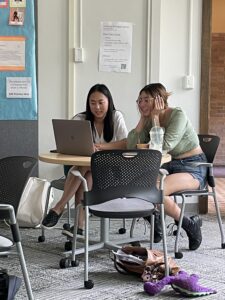Working together in groups, whether in a study group or on a group project, when done well is a great opportunity to practice important collaboration and team-work skills. Keep in mind that it is students’ responsibility to know your instructor’s expectations about working together.
Why is studying with other students important and how do you set up an effective study group?
Learning with a group of peers is a powerful tool! Study groups are a place to work on challenging concepts and learn from each other. Sometimes other students have questions you didn’t even know you have, and setting a regular time and place to study can help with procrastination. Plus, explaining material to other students is a great way to solidify your knowledge. If you work with classmates from a variety of backgrounds, you will gain unique insights and learn more from each other.
The links below will take you to some guides on how to study together in study groups (or with a study partner).
- Find study partners – Cornell students who interested in finding study partners for a class they are in can sign-up to be matched with other students in the class.
- Student Guide for Studying Together
LSC can help match you with study partners for your classes!
Check out other LSC resources to get ideas about how to study more effectively, and to discover and stay in your own academic groove.
Would you like to learn more?
Crouch, C. H., & Mazur, E. (2001). Peer Instruction: Ten years of experience and results. Am. J. Phys. American Journal of Physics, 69(9), 970. http://web.mit.edu/jbelcher/www/TEALref/Crouch_Mazur.pdf
Duhigg, Charles. 2016. What Google Learned From Its Quest to Build the Perfect Team. The New York Times. Electronic document, http://www.nytimes.com/2016/02/28/magazine/what-google-learned-from-its-quest-to-build-the-perfect-team.html
Oakley, B., Felder, R., Brent, R., & Elhajj, I. (2004). Turning student groups into effective teams. Journal of Student Centered Learning, 2(1). 9-34. https://www.researchgate.net/publication/242350622_Turning_student_groups_into_effective_teams
Micari, M., & Light, G. (2009). Reliance to Independence: Approaches to learning in peer‐led undergraduate science, technology, engineering, and mathematics workshops. International Journal of Science Education, 31(13), 1713-1741. https://www-tandfonline-com.proxy.library.cornell.edu/doi/full/10.1080/09500690802162911
Smith, M. K., Wood, W. B., Adams, W. K., Wieman, C., Knight, J. K., Guild, N., & Su, T. T. (2009). Why Peer Discussion Improves Student Performance on In-Class Concept Questions. Science, 323(5910), 122-124. https://www.researchgate.net/publication/23716395_Why_Peer_Discussion_Improves_Student_Performance_on_In-Class_Concept_Questions

